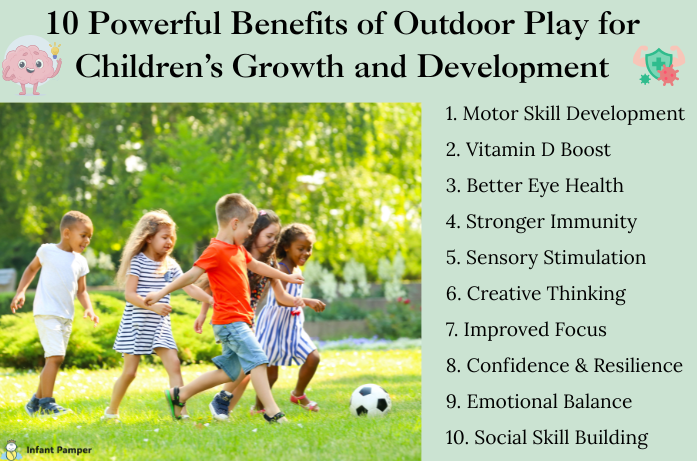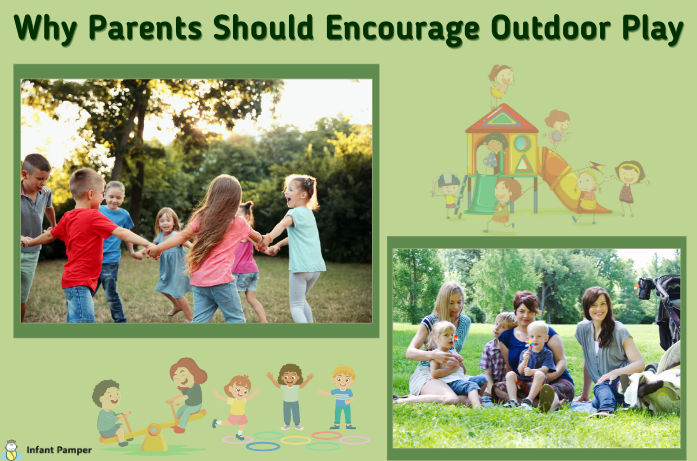By Infant Pamper Team
In today’s world of glowing screens and exploding schedules, the simple joy of outdoor play almost feels forgotten. So much so that many toddlers can easily swipe a tablet yet resist barefooting on grass. As parents, we constantly are caught up in weighing the issues of safety, learning, and entertainment for our kids. But what if one of the best building blocks for your child could somehow be found not in an app or in a classroom but just right outside your door?
At Infant Pamper, we believe in nurturing the whole child, body, mind, and heart. Outdoor play is not just a way to release energy; it is a very potent, science-backed basis for one’s positive development. So here is why allowing children to do what they do best, play, can be one of the greatest gifts you can ever give them.

10 Proven Outdoor Play Benefits for Children’s Growth and Development
Physical Powerhouse: Strengthening Growing Bodies
1. Better Development of Motor Skills
Playing outdoors promotes the development of both gross and fine motor skills in children. They are running, jumping, climbing, and balancing, which actually helps exercise and hone their big muscles. Currently, collecting pebbles, tying grass, or digging in the soil enhances hand coordination and grip strength. These skills will promote writing, dressing up, and self-feeding.
Benefits at a glance:
- Gross motor strength from physical movement
- Fine motor control from hands-on interaction
- Builds coordination, balance, and core strength
- Prepares the body for independence and self-care
2. The Sunshine Vitamin: Natural Source of Vitamin D
When children are outdoors, their bodies produce Vitamin D naturally, and this vitamin is very important for bone growth and the strength of the child’s immune system. The American Academy of Pediatrics and National Institutes of Health (NIH) note that many kids today are deficient because of limited outdoor play. Even 15–30 minutes of sunshine a few times a week helps reduce the risk of Vitamin D deficiency.
Benefits at a glance:
- Supports strong bones and teeth
- Helps calcium get absorbed in the body
- Boosts immune response and energy levels
- Helps reduce the risk of Vitamin D deficiency
3. Better Vision and Eye Development
Outdoor fries myopic-near sightedness in children. In fact, they would do the eyes some good: focusing on distant objects and adjusting to natural light. Unlike screen time, outdoor play helps the eyes develop appropriately and reduces eye strain in early childhood. The UNESCO Courier also highlights outdoor play as a protective factor against early vision problems.
Benefits at a glance:
- Guards against early near sightedness
- Builds eye muscles and promotes depth perception
- Encourages healthy visual development
- Provides natural relief from screen fatigue
4. Immune System Boost
Exposure to outdoor environments helps strengthen a child’s immune system. Dirt, plants, and natural microbes teach the immune system how to respond appropriately to allergens and germs. This supports the “hygiene hypothesis,” The Centers for Disease Control and Prevention (CDC) confirms that outdoor activities also lower childhood allergy risks.
Benefits at a glance:
- Builds immunity through natural exposure
- Reduces allergy and asthma risks
- Encourages microbial diversity in the body
- Strengthens resistance to common infections
Brain Boost: Cognitive & Sensory Development
5. A Multisensory Experience
Nature is a wonderful sensory environment which cannot be offered indoors. A child touches the grass, listens to the chirping of birds, watches the clouds, and smells the fresh scent of flowers-Hence, all these experiences help create neural avenues in the brain. Such sensory experiences lay down a foundation for memory, language acquisition, and learning. Research from Harvard University’s Center on the Developing Child shows sensory play strengthens brain development in early years.
Benefits at a glance:
- Natural stimulation of all five senses
- Enhances memory development and cognition
- Supports emotional regulation via sensory input
- Fuels accelerated brain development
6. Igniting Creativity and Problem-Solving
The outdoor environment invites imaginative and free play. A stick becomes a sword, a stone becomes a treasure, a bush becomes a secret fort. Such creative ideas promote adaptive and critical thinking and maintain independence in daily life.
Benefits at a glance:
- Encourages problem-solving through pretend play
- Inspires imagination without screen dependency
- Helps children invent games and set their own rules
- Builds confidence through self-directed activity
7. Increased Attention Span
Natural settings calm young minds, reduce stress hormones like cortisol, and improve focus. Studies at Stanford University found that time in nature reduces mental fatigue and boosts attention. These benefits are especially valuable for children with attention difficulties.
Benefits at a glance:
- Reduces hyperactivity and impulsiveness
- Attention and focus capacity are supported to build
- Improves mood and patience in daily life
- Stress and anxiety are reduced in more natural ways
Emotional & Social Benefits
8. Builds Confidence and Resilience
In outdoor play, children learn to deal with and master challenges, take risks, and bounce back from failure. Whether they are climbing a tree or falling in the mud, they know that it is okay to make mistakes and try again, a realization that nurtures their emotional development and lifelong resilience.
Benefits at a glance:
- Cultivates courage through minor challenges
- Builds self-confidence in new experiences
- Supports learning through trial and error
- Encourages emotional growth
9. Improves Emotional Regulation
Time spent in nature calms children and balances their emotional state. Nature features such as wind, chirping of birds and rippling of water almost reset the nervous system of children. After spending time in nature, children have fewer temper tantrums and their mood improves.
Benefits at a glance:
- Reduces tantrums and emotional outbursts
- Encourages calm through natural surroundings
- Supports self-regulation of emotions
- Helps kids feel secure
10. Enhances Social Skills
Outdoor play develops cooperation, sharing, and teamwork. Fewer rules, plenty of space: children learn to express, negotiate, and resolve conflicts independently. These foregrounded social interactions tone empathy, leadership, and friendship skills.
Benefits at a glance:
- Builds communication and cooperation
- Strengthens empathy and emotional awareness
- Encourages teamwork in playing groups
- Promotes turn-taking and conflict resolution
Deepening Nature Connection and Stewardship
Children who spend much of their time either playing in or among nature are also more likely to care for it as adults.
- They develop empathy for living things
- They understand how ecosystems work
- They value clean air, water and sustainability
With climate challenges magnifying, bringing up environmentally conscious children starts with a little thing-the pleasure of time spent in nature.
Organizations such as Children & Nature Network contend that the outdoor play is crucial to the process of producing healthier, happier, and environmentally aware kids.
Practical Tips for Parents
Keep it Short: No need to plan a whole adventure; a simple 15–20 minutes in the backyard or garden, or a short walk in the neighborhood, can impact your child’s day significantly.
Make Outdoor Time a Daily Habit: Just like any one other special routine, play outside should be like that-one-other-activity that lands on the schedule every day, together with meal times, naps, or story time. Block time every day for nature to give your family rhythm.
Dress Up for Outdoor Time: The weather need not be a bar to any good outdoor fun. With the right gear-raincoat, boots, hat, or sunscreen-the kids can just survive in the sunshine through all four seasons. A little preparation takes the worry out of outdoor time.
Welcome the Mess: Surely grass stains, muddy shoes, and sand-filled pockets are the sign of a good day! Embrace the mess as a symbol of healthy and happy exploration of the natural world.
Play: Children do what their parents do. Put down your phone, step outside with him/her, and join the fun-climbing, exploring, laughing, and making memories together. The experience just becomes better with your presence, see UNICEF’s guide on games for child development.
FAQs
Q1: How much outdoor play does my child need?
Experts say at least 1 hour each day, but the more, the better.
Q2: Is outdoor play safe in urban areas?
Under supervision, of course! Use a park, the schoolyard, or create a little balcony garden. The point is to engage with nature, not necessarily with some kind of deep wilderness.
Q3: What if my child doesn’t like being outside?
Still, begin doing what he or she currently enjoys: reading, music, or games-not inside anymore. Curiosity will eventually win out.
Disclaimer: This article contains only informational content. Always watch your child during any outdoor activity and seek medical advice if your child has any medical condition affecting physical activity or exposure to sun.
Final Thought
Today, when screens have set the pace of life, outdoor play is a welcome freedom for children. It is the freedom to move, the freedom to explore, and the freedom to develop muscle strength. On a parallel plane from working out and exercising, outdoors really opens up a calm yet active confederacy for confidence-building, fortitude, and problem-solving.
These activities boost your child’s emotional health and foster a deeper connection with nature. Not only are they a way for your child to take a break from the mundane routine, but they will also be very helpful in your child’s development. So get outside, take a deep breath, and watch your child experience joy and wonder firsthand.
At Infant Pamper, truly we believe that the best childhood memories are made under the sky. So hold your little one’s hand, step outside, and let the grass, sunshine, and fresh air work their magic. Each giggle, muddy shoe, and curious glance at nature builds a stronger, happier child.




